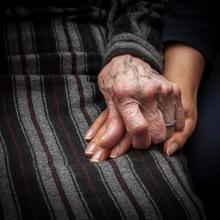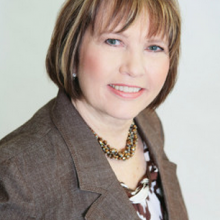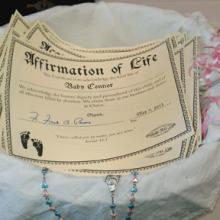heaven
In my Mexican heaven, my grandfather's hands would be calloused from turning pages of poetry. He would be sitting at the dinner table, sipping coffee, and reading, looking up as I walked out the door to tell me “que dios te bendiga mijo.” He wouldn’t sing hymns or shout hallelujah, but every evening at the same time he’d sing the song “Gema” to my grandmother.
TO TAKE MY mind off Ted Cruz being with us for another six years, I’ve found that repeatedly jabbing a needle into my knee seems to work best. But today I’m thinking of the more comforting world of assisted living, specifically the current residence of my elderly parents. Although I have to be careful using that word “elderly,” since I am, ahem, of a certain age myself. And I have my own burden to bear. (Recently, several people remarked that I look like Clint Eastwood, that handsome paragon of Hollywood masculinity. But they weren’t talking about Clint Eastwood in his prime, but rather the current Clint Eastwood, who’s 88. That hurts.)
My parents reside at a Baptist senior center near Florence, S.C., a town not named after a recent hurricane that bulldozed its way through the South. There wasn’t much left, anyway, after Hurricane Matthew came through earlier. (And then there was Michael, another “100-year storm,” a phrase that apparently now means “monthly.”)
Visiting my parents is always a joy, as well as a jolt. The jolt comes when driving from North Carolina into South Carolina, where the road immediately becomes cracked and rough, registering the difference between a state that responsibly maintains its highways and one that instead puts its money into maintaining the 41st-best health care in the nation, not to mention the 48th-best education. (High fives for Mississippi, which is way up at 46th!) In fairness, South Carolina ranks 12th in gun ownership, so you probably don’t want to complain about the roads.
The church’s predominately black congregation once mirrored the neighborhood’s demographics. But today hip and eclectic East Nashville, with its rising property values and trendy restaurants, draws white millennials, said the Rev. Morris Tipton Jr., the church’s pastor.
Given the neighborhood’s shift, is Tipton worried about the church’s future?
Art and Christianity give our lives import and meaning, irrespective of power, race, gender or class. Jesus did this when he overturned the Greek and Roman way of viewing the world, in which one’s social status was everything, and introduced the notion of the equal worth and dignity of all human beings. “Here there is no Gentile or Jew, circumcised or uncircumcised, barbarian, Scythian, slave or free, but Christ is all, and is in all (Col. 3:11),” wrote Paul. All people made in the image and likeness of God, “lovely in limbs."

Holding hands in a nursing home, Eduard Darchinyan / Shutterstock.com
The nursing home was quiet, which is typical for a late Sunday afternoon. I walked to the end of the hall where Grace lives in a room decorated with clown figurines that make her smile. I knocked at the doorway and announced myself. Grace was awake in bed, but upset about something.
“Oh, Joe! Come in! Can you do me a favor? I’ve lost something and could use your help finding it.”
Grace (not her actual name; I have to change it because of privacy laws) once had bright red hair that fit her personality. The red is gone now; her hair turned a pretty, cottony white after chemotherapy.
And today, something else was missing.
“I can’t find my left boob,” she said. “Would you be a dear and look around for it?”
A YEAR BEFORE her death from ovarian cancer, my 78-year-old mother finally started losing weight. She gave up fatty foods and sweets and went to herbalists who sold her pills that were supposed to regulate her digestion. In addition to all this, she was seeing her primary physician every three months.
The weight flying off seemed like a reward for her good behavior. The only downside was that my mother, who now weighed less than me, was burping all the time, as if there was thunder trapped inside her ever-shrinking body.
At Christmas time, I invited her to come spend the holidays with me and my family in Miami. At first she said no. Her birthday was three days after Christmas and she wanted to spend it at her home in New York.
She changed her mind right before Christmas, and she cooked us a wonderful Christmas dinner, and we took her to one of our favorite Haitian restaurants for her birthday. At her birthday dinner, my two daughters performed a birthday dance for her in the middle of the restaurant, and my usually reserved mother laughed and clapped with joy, a kind of joy we would rarely see again in the months that followed.
So much of Christianity has become about avoiding hell. But if there’s one thing I’ve learned as a hospital chaplain, it’s that God is sending Christians straight to hell.
Christians need to stop thinking of heaven and hell as primarily places we go after we die. Heaven and hell are primarily realities that we experience here on earth.
Jesus said, “the kingdom of God is among you.” For Jesus, the kingdom of God, also known in the Gospels as the kingdom of Heaven, is a present reality. You don’t have to wait until after death. In fact, you shouldn’t wait because it’s here. It’s now. It’s among you.
Now, if the kingdom of God is a present reality, we can safely assume that hell is also a present reality. In fact, the word Jesus frequently used for “hell” was the term Gehenna. Gehenna was well known in the ancient city of Jerusalem as “the valley of the son of Hinnom.” Within the valley was a place called Topheth, where people would sacrifice their children, thinking that God demanded this sacrificial violence. As the prophet Jeremiah explains, this hell on earth is a purely human creation and God had nothing to do with this hell. Jeremiah said about those who sacrifice their children, “And they go on building the high place of Topheth, which is in the valley of the son of Hinnom, to burn their sons and their daughters in the fire—which I did not command, nor did it come to my mind.”
God doesn’t command the fires of hell; it doesn’t even come to God’s mind! Who, then, does command those fires? We do! René Girard said it succinctly in his book The Scapegoat, “[We] create [our] own hell and help one another descend into it.”
Hell is a place of suffering caused by spiritual, emotional, and physical violence. What does the kingdom of Heaven do when confronted with the violence of hell? The kingdom of Heaven goes straight into it.
This Nov. 2, on what is known as All Souls’ Day, Roman Catholics around the world will be praying for loved ones who have died and for all those who have passed from this life to the next. They will be joined by Jerry Walls.
“I got no problem praying for the dead,” Walls says without hesitation — which is unusual for a United Methodist who attends an Anglican church and teaches Christian philosophy at Houston Baptist University.
Most Protestant traditions forcefully rejected the “Romish doctrine” of purgatory after the Reformation nearly 500 years ago. The Protestant discomfort with purgatory hasn’t eased much since: You still can’t find the word in the Bible, critics say, and the idea that you can pray anyone who has died into paradise smacks of salvation by good works.
The dead are either in heaven or hell, they say. There’s no middle ground, and certainly nothing the living can do to change it.
Many Catholics don’t seem to take purgatory as seriously as they once did, either, viewing it as fodder for jokes or as the “anteroom of heaven,” an unpleasant way station that is only marginally more appealing than hell.
But Walls is a leading exponent of an effort to convince Protestants — and maybe a few Catholics — that purgatory is a teaching they can, and should, embrace. And he’s having a degree of success, even among some evangelicals, that hasn’t been seen in, well, centuries.
When I was a child, my vision of heaven was riddled with roller coasters and populated by Disney characters. Let me explain.
Growing up in Puerto Rico, the American “mainland” to our north was for me a dreamland of sorts. You could catch a glimpse of it on television show depicting Main Streets lined with impressive trees. And of course, there was Disney World. As a five-year old visiting Florida for the first time, I imagined that the rest of the country was just like that particular corner of Orlando that we tourists saw.
That was heaven on earth for the five-year-old version of me. Heaven was earthly and joyful and fun and sweet. But as we all know Disney is no paradise. I don’t expect long lines, lots of sweat, and expensive but mediocre food in heaven.
When I was five, Disney was my vision of heaven. As I grew up in the church, my vision turned upward. Heaven was an eternal destination deferred until the moment after you die. Heaven was a place of reward and eternity. Heaven was an ethereal experience, something so otherworldly that the best we could do was speak in metaphors and images about it. Heaven, in short, had very little to do with the world as we knew it.
Neither vision gets it quite right.
Last week during my Sunday school class, one of my second graders asked, “How can we go to heaven, if we continue to sin?”
As usual, I am often stunned and quieted by the striking questions that come from the mouths of young people.
I usually respond to the inquisitive questions from my Sunday School students by reiterating what I have been told by many a Sunday School teacher: “Even though we break our promises, God doesn’t; God promised us if we believe in God and that God’s Son Jesus died for our Sins, we will go to heaven — even when we mess up.”
While that seems like a really ‘simple’ explanation of one of many biblical truths, it is still striking and amazing that even though we continue to ‘mess up,’ God has not retracted on God’s promise of offering us a beautiful ending to the troubled world we live in today.
As I think about Romans 8:21 and how it speaks to the fact that “creation itself will be liberated from its bondage to decay and brought into the freedom and glory of the children of God,” I get excited. Not only because we all will see the glory of God one day, but that the bondage and decay we are experiencing in our physical world will end in Glory!
Countering the notion that Mormons believe they will someday inherit their own planets, the Church of Jesus Christ of Latter-day Saints has issued a new statement on “Becoming Like God” that tries to put distance between official church teaching and the age-old notion.
The article, which was posted on the church’s website last week, attempts to explain complex theology that church officials believe has been overly simplified into inaccurate “caricatures.”
Just as heaven is often depicted as people sitting on clouds strumming harps, “Latter-day Saints’ doctrine of exaltation is often similarly reduced in media to a cartoonish image of people receiving their own planets,” the statement says.
MANY PEOPLE HAVE been given a very tame and uninteresting version of Jesus. He was a nice, quiet, gentle, perhaps somewhat fragile guy on whose lap children liked to sit. He walked around in flowing robes in pastel colors, freshly washed and pressed, holding a small sheep in one arm and raising the other as if hailing a taxi. Or he was like an “x” or “n”—an abstract part of a mathematical equation, not important primarily because of what he said or how he lived, but only because he filled a role in a cosmic calculus of damnation and forgiveness.
The real Jesus was far more complex and interesting than any of these caricatures. And nowhere was he more defiant, subversive, courageous, and creative than when he took the language of fire and brimstone from his greatest critics and used it for a very different purpose.
The idea of hell entered Jewish thought rather late. In Jesus’ day, as in our own, more traditional Jews—especially those of the Sadducee party—had little to say about the afterlife, about miracles, about angels and the like. Their focus was on this life and on how to be good, just, and successful human beings within it. More liberal Jews—especially of the Pharisee party—had welcomed ideas on the afterlife from neighboring cultures and religions, especially the Persians.
To the north and east in Mesopotamia, people believed that the souls of the dead migrated to an underworld whose geography resembled an ancient walled city. Good and evil, high-born and lowly, all descended to this shadowy, scary, dark, inescapable realm. For the Egyptians to the south, the newly departed faced a ritual trial of judgment. Bad people who failed the test were then devoured by a crocodile-headed deity, and good people who passed the test settled in the land beyond the sunset.
I’ve been thinking about what it means to be chosen, and conversely how we choose to be chosen. I’ve also been thinking about life, death, choices, and what happens to us after our earthly body dies. Do we remember who we are here? Do we remember our friends, lovers, enemies, acquaintances? Do we remember events, important moments, unimportant moments, or forgotten moments? I believe we do. The problem is that all we know and have experienced about the Divine is limited by our own thoughts and words.
Eva Piper considered herself a shallow Christian until the accident that revitalized her faith and turned her Baptist pastor husband, Don Piper, into the best-selling author of “90 Minutes in Heaven.”
“It wasn’t until Don’s accident that I really opened myself up to a really honest relationship with the Lord,” said Eva Piper, who says she’s embarrassed to recall her superficial faith.
Eva Piper writes about life after her husband’s alleged visit to heaven in “A Walk Through the Dark,” released on July 30. Her book comes nine years after the publication of her husband’s book, which spent more than five years on The New York Times’ best-seller list.
Sarah Decareaux was lying on the cold, concrete floor of a barn.
She closed her eyes, curled her knees into her chest, and told herself that what was happening wasn’t real.
She felt claustrophobic. She was having trouble breathing. Her vision tunneled, the same way it had when she’d been in labor. She could see only a few feet in front of her.
Now that the trial for abortion provider Kermit Gosnell has ended with a conviction, many are asking what public officials in Philadelphia plan to do with the 47 bodies from the case.
After Gosnell’s arrest in 2011, then-Archbishop Cardinal Justin Rigali asked the district attorney’s office for the bodies of the aborted fetuses. The bodies were being retained for the trial, but after it ended and Gosnell was sentenced to life in prison, his successor, Archbishop Charles Chaput, has renewed the request to bury the bodies.
Francis Maier, special assistant to Chaput, said that he doesn’t know whether or not a service would include a Catholic Mass, but he said it would be quiet and dignified.
My friend Mike died last week.
We were the same age. We grew up together in Marinette in northeast Wisconsin. Worked our way through Boy Scouts together. Played at each other’s houses. Studied in the same classrooms. And then, over time, we drifted apart. Until this past year. That’s when I learned that Mike was dying of cancer.
In less than 12 months, we re-established a friendship and Mike and his wife, Nancy, taught me amazing lessons about living with the prospect of dying.
In our initial contacts, Nancy wrote of Mike:
“He is doing well with his treatments. I am amazed, each day, how well he handles this journey we are on. Never once have we asked ‘why us?’ We feel so blessed that we have each day to love each other and enjoy our retirement one day at a time. Not everyone is so lucky to have a long goodbye with the one they love.“
HOW SHALL WE engage with scripture through all 50 days of Easter? There are clues in the haunting story of Jesus' appearance beside the sea of Tiberius. After Easter Day many of us are ready to let things quickly revert to normal. It is, strangely, both reassuring and uncomfortable to hear that those disciples, whose business had been fishing, wanted to get back to their boats so promptly after the horrors and wonders they had witnessed in Jerusalem.
Jesus is waiting for them by the shore with breakfast already cooking. All is ready, yet he wants them to bring some of what they haul up in their nets, so he can include samples of their own catch in the menu. And what a catch it was!
Easter is our time to experience the grace that is always ahead of our game and is underway for us before we are ready. Yet grace does not exclude what we bring to the table. Grace expects and includes the work of our hands, the weavings of our imaginations, and the gifts of our unique experiences. In one sense, Eastertide is more truly a season of repentance than is Lent. One thing we might need to repent of is our passivity—those times when we expect God to hand us on a plate the meaning we are hungry for. We need to bring our own bits to the cooking fire if we are to really eat with Jesus. It is part of the mix of grace that we must participate, not just receive.















